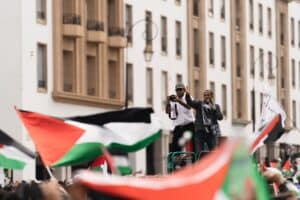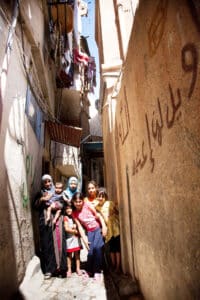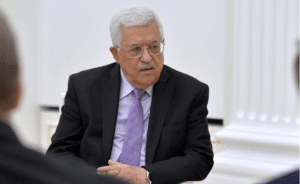This Sunday, 21 May, Israel’s far-right security minister Itimar Ben-Gvir visited Jerusalem’s most sensitive holy site and declared Israel was ´in charge´. The recent visit to the site, which holds deep religious significance for both Jews as the Temple Mount, and Muslims as the compound housing al-Aqsa Mosque, occurred shortly after incidents where groups of Jewish youths clashed with Palestinians and engaged in the chanting of racist slogans during a nationalist march through the Old City
Ben-Gvir said during his visit to the compound “I am glad to ascend the Temple Mount, the most important place for the nation of Israel. Police are doing wonderful work here and again giving a reminder of who the master of the house is in Jerusalem. All of Hamas’s threats won’t help. We are the masters of Jerusalem and all of the land of Israel.”
Provocation
The Palestinian Authority (PA) strongly condemned Ben-Gvir’s visit to the Al-Aqsa Mosque. The PA spokesman Nabil Abu Rudeineh said “Any harm to Al-Aqsa Mosque is playing with fire and will drag the region into a religious war with undesirable consequences that will effect everyone”. The spokesperson has called upon the United States and the international community to take immediate action in preserving the existing status quo at the Al-Aqsa complex. Under the arrangements established since Israel’s occupation of the site, along with East Jerusalem, during the 1967 war, Jews have been permitted to visit the site, but only Muslims are allowed to pray. In recent years, there has been an increase in Jewish visits and calls for Jewish prayer, which has generated concerns among Muslims about a potential takeover. Simultaneously, the enforcement of the ban on Jewish worship by the police has become more lenient, often allowing Jews to pray in the eastern corner of the compound. They tend to use their mobile phones for reading prayers rather than traditional prayer books. Ben-Gvir was seen doing this, which was recorded on video. Ahmad Mujdalani, Palestinian minister of social development called Ben-Gvir’s visit “a provocative expression by the Israeli government as a whole, not just an individual expression by Ben-Gvir. It is official policy to harm the feelings of Muslims worldwide, particularly Palestinians. We warn that if this continues, then it changes the situation from a political conflict to a religious one that cannot be controlled. The danger of this to the region cannot be overestimated.” US State Department Spokesperson Metthow Millor, said that the United States is “concerned by the provocative visit to the Temple Mount/Haram al Sharif in Jerusalem and the accompanying inflammatory rhetoric. This holy space should not be used for political purposes, and we call on all parties to respect its sanctity”.
Settlement expansions
In December, Netanyahu’s government was formed and is seen as the most right-wing in Israeli history. The government comprises ultra-Orthodox and far-right nationalist parties and has prioritized West Bank settlement construction. It is important to note that most of the international community views Israeli settlements, housing approximately 700,000 people in the occupied West Bank and East Jerusalem, as illegal and obstructions to peace.
In March, the government repealed a 2005 act that dismantled four West Bank settlements. The repeal of certain clauses in a previous disengagement law allows Jewish resident to return to the settlements on condition of approval by the Israeli military. The European Union and the United States quickly condemned this action. State Department deputy Spokesperson Vedant Petal said “We are deeply troubled by the Israeli government’s order that allows its citizens to establish a permanent presence in the Moesh outpost in the Norther West Bank. The U.S. strongly urges Israel to refrain from allowing the return of settlers to the area covered by the legislation, consistent with both former Prime Minister Sharon and the current Israeli government’s commitments to the United States. Advancing Israeli settlements in the West Bank is an obstacle to the achievement of a two-state solution”. However, this Sunday, on 21 May, Defense Minister Yoav Gallant issued the order to authorize entry into the Momesh outpost for Israelis, one of the four dismantled West Bank settlements.
In April, UN experts urged the international community to take immediate action to stop Israel’s forced evictions and displacement of Palestinians in East Jerusalem. They said “Israel’s transfer of its own population into the occupied territory confirms a deliberate intention to colonise the territory it occupies a practice strictly prohibited by international humanitarian law. It amounts to a prima facie war crime”.
Oslo Accords are not working
The occupied West Bank is divided into three regions, namely A, B, and C, as outlined in the Oslo Accords signed by the Palestine Liberation Organization (PLO) and Israel in 1993 and 1995. These agreements aimed to establish an interim Palestinian government, known as the Palestinian Authority (PA), with limited governance powers in areas A and B. However, the implementation of the Oslo Accords has resulted in Israel retaining complete control over the Palestinian economy, civil matters, and security in over 60 per cent of the West Bank, designated as Area C. While the interim government has been granted administrative and internal security control in certain parts of the West Bank, Israel maintains military authority throughout the entire area. Around 12 percent of the Palestinian population in the West Bank resides in area C. however, a significant portion of Area C, at least 46 percent, consists of privately owned Palestinian land. Less than 1 percent of this land is accessible for Palestinian construction. Israeli human right group B’Tselem, said Israel has restricted Palestinians from building on, or even accessing much of the land in Area C, regularly denying request for building permits. Palestinians who attempt to build in the area are subject to home demolition orders, resulting in displacement and the disruption of livelihoods.
Remarkably, over 70 percent of area C is utilized for 200 illegal Israeli settlements, where more than 400,000 settlers live, military firing zones, and other restricted areas. This has further limited Palestinian access and rights to their own land. Since 1967, the Israeli government has constructed hundreds of illegal settlements and outpost, many of which were built entirely or partially on privately owned Palestinian land. These settlements are now home to approximately 700,000 Israeli settlers. Israeli Prime Minister Benjamin Netanyahu has pledged to annex portions of Area C, where approximately 65,000 Palestinians and 11,000 Israeli settlers reside. These developments have raised significant concerns regarding the prospects for a viable Palestinian state and a just resolution to the Israeli-Palestinian conflict. The international community has repeatedly criticized the expansion of Israeli settlements and called for a halt to these activities in order to pave the way for a negotiated and peaceful solution.
Palestinians fear displacement
In the first three months of 2023, Israeli forces have forcefully displaced 218 Palestinians from their homes through demolitions in Area C, which accounts for more than a third of the total 594 Palestinians displaced in all of 2022 The presence of Israel’s illegal settlements, the separation wall, and numerous military checkpoints and bases have created a fragmented reality in the West Bank, with 165 disconnected Palestinian “enclaves” facing severe development and movement restrictions. These restrictions hinder the potential for growth and connectivity within the Palestinian territories. Over the past decades, hundreds of Palestinian properties in occupied East Jerusalem have been taken over by settlers, partly due to a law that allowed Jews to claim real estate that they say was Jewish property before 1948. Over 5,000 Palestinians are currently facing the threat of forced eviction. However, Israeli authorities have been offering subsidies, tax incentives, and affordable utilities to incentivize Jewish Israelis to settle in 279 illegal settlements, which currently houses more than 465,400 Israeli settlers.
The successive Israeli government’s legalization of numerous settlements in the West Bank has created an immense barrier to the possibility of a two-state solution. These settlements, constructed on land that is internationally recognized as belonging to Palestinians, undermine Palestinian sovereignty and pre-emptively fragment any future Palestinian state by restricting its urban development. The increased Israeli security presence in the West Bank, coupled with ongoing provocations by Israeli settlers towards Palestinians further complicates the establishment of a secure and stable Palestinian state. Achieving security, stability and civil peace becomes incredibly challenging in the presence of foreign security forces that undermined the sovereignty of the state and engage in aggressive acts against its citizens.
Author: Manouk Bronzwaer



